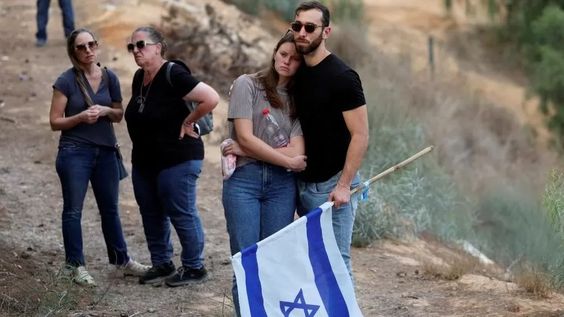World
Israel still grappling with the raw pain caused by Hamas attacks, even a month later

That day destroyed Israel’s confidence in its military power and sense of invincibility, weakening the sense of security that all of its people felt.
But initially, it didn’t seem all that remarkable.
We were unaware of the extent of the attack until I noticed the “red alerts” in the early hours of the morning on my phone, alerting me to impending rocket fire from Gaza. I texted my coworkers to let them know I would be heading into the office, even though some of them were away for the last few days of the Jewish holidays.
Before I knew it, I was having trouble understanding the significance of what I was saying live, even while I was speaking.
What I thought was an intense missile fire that caused me to dash in and out of the workplace air raid shelter was actually a pretext for an unprecedented, intricate, and meticulously organised series of attacks.
READ ALSO: Blinken visits Jordan to discuss the Israel-Hamas conflict and the humanitarian crisis in Gaza
Horrifying footage showed Hamas soldiers slicing through gaps in Gaza’s outer barrier on motorbikes, launching themselves into southern Israel, overrunning well defended military installations, and taking videos of themselves in the gardens of overrun kibbutzim.
At the now-famous Nova Music Festival, partygoers called into Israeli TV stations over excruciating hours, recounting killings while they fled from guns. Residents, horrified, posted videos of armed Palestinian groups patrolling Sderot’s streets.
It turned out to be the bloodiest day in Israel’s seventy-five-year existence, with individuals being brutally and methodically killed. Later film came from some of the kibbutzim around Gaza, depicting the ruthless murder of entire families. In the end, it’s estimated that 1,400 people died.
The date of this invasion was significant since it occurred nearly exactly 50 years after a major regional war was started by a surprise attack by Egypt and Syria on Yom Kippur, the holiest day in the Jewish calendar.
When I visited Ashkelon on October 8, the sheer suffering and shock that ordinary Israelis were experiencing was clearly visible.
Parents in the hospital cried and collapsed in agony as they searched frantically for their missing children while Israeli security forces continued to engage heavily armed men practically down the street from us as missile sirens continued to blare.
BBC
